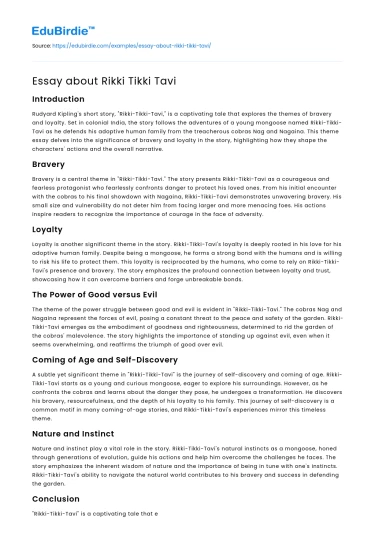Introduction
Rudyard Kipling's short story, "Rikki-Tikki-Tavi," is a captivating tale that explores the themes of bravery and loyalty. Set in colonial India, the story follows the adventures of a young mongoose named Rikki-Tikki-Tavi as he defends his adoptive human family from the treacherous cobras Nag and Nagaina. This theme essay delves into the significance of bravery and loyalty in the story, highlighting how they shape the characters' actions and the overall narrative.
Bravery
Bravery is a central theme in "Rikki-Tikki-Tavi." The story presents Rikki-Tikki-Tavi as a courageous and fearless protagonist who fearlessly confronts danger to protect his loved ones. From his initial encounter with the cobras to his final showdown with Nagaina, Rikki-Tikki-Tavi demonstrates unwavering bravery. His small size and vulnerability do not deter him from facing larger and more menacing foes. His actions inspire readers to recognize the importance of courage in the face of adversity.
Save your time!
We can take care of your essay
- Proper editing and formatting
- Free revision, title page, and bibliography
- Flexible prices and money-back guarantee
Loyalty
Loyalty is another significant theme in the story. Rikki-Tikki-Tavi's loyalty is deeply rooted in his love for his adoptive human family. Despite being a mongoose, he forms a strong bond with the humans and is willing to risk his life to protect them. This loyalty is reciprocated by the humans, who come to rely on Rikki-Tikki-Tavi's presence and bravery. The story emphasizes the profound connection between loyalty and trust, showcasing how it can overcome barriers and forge unbreakable bonds.
The Power of Good versus Evil
The theme of the power struggle between good and evil is evident in "Rikki-Tikki-Tavi." The cobras Nag and Nagaina represent the forces of evil, posing a constant threat to the peace and safety of the garden. Rikki-Tikki-Tavi emerges as the embodiment of goodness and righteousness, determined to rid the garden of the cobras' malevolence. The story highlights the importance of standing up against evil, even when it seems overwhelming, and reaffirms the triumph of good over evil.
Coming of Age and Self-Discovery
A subtle yet significant theme in "Rikki-Tikki-Tavi" is the journey of self-discovery and coming of age. Rikki-Tikki-Tavi starts as a young and curious mongoose, eager to explore his surroundings. However, as he confronts the cobras and learns about the danger they pose, he undergoes a transformation. He discovers his bravery, resourcefulness, and the depth of his loyalty to his family. This journey of self-discovery is a common motif in many coming-of-age stories, and Rikki-Tikki-Tavi's experiences mirror this timeless theme.
Nature and Instinct
Nature and instinct play a vital role in the story. Rikki-Tikki-Tavi's natural instincts as a mongoose, honed through generations of evolution, guide his actions and help him overcome the challenges he faces. The story emphasizes the inherent wisdom of nature and the importance of being in tune with one's instincts. Rikki-Tikki-Tavi's ability to navigate the natural world contributes to his bravery and success in defending the garden.
Conclusion
"Rikki-Tikki-Tavi" is a captivating tale that explores themes of bravery and loyalty. Through the journey of the young mongoose, readers are reminded of the power of courage in the face of adversity and the enduring bonds formed through loyalty and trust. The story's exploration of good versus evil, coming of age, and the wisdom of nature adds depth and richness to the narrative. "Rikki-Tikki-Tavi" remains a timeless story that continues to inspire readers with its themes and the enduring qualities of bravery and loyalty it celebrates.






 Stuck on your essay?
Stuck on your essay?

